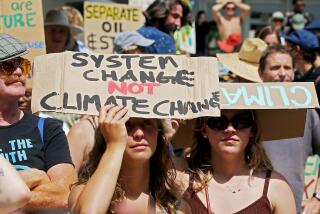McAuley Oil Fate Rides on Settlement of Feud
- Share via
The family feud at McAuley Oil Co. of Buena Park looks a little like the fight for Ewing Oil on “Dallas.”
At McAuley, as at Ewing, principals of a family-owned multimillion-dollar concern have been slugging it out, with the future of the company at stake. Whereas the Ewing battle pitted brother against brother, the McAuley struggle has pitted son against father.
The fight--involving Richard McAuley, 38, and Charles, 65--is not unlike those experienced by many family-owned businesses, although this one is being mediated by the courts.
And the 3 1/2-year legal battle, which may end this week with a judge’s ruling, could lead to the corporation being dissolved and its assets sold.
Richard McAuley is seeking the dissolution because, according to court papers, he believes his father maneuvered to have him ousted as president in 1981 and has allowed him no say in the operations of the privately held corporation, in which he owns a minority but still substantial block of the stock. Richard also has alleged that his father mismanaged the company, wasted resources and refused to allow him to trade his shares for cash or assets.
Charles McAuley, who founded the company in 1959 and has for many years served as board chairman, denies all the charges. He acknowledges having his son fired--something he says was done after consulting with the board of directors--but contends that Richard was doing business on the side and taking opportunities away from the corporation.
The court battle has come during a difficult period for McAuley Oil, which, despite its name, is no longer in the oil business. The company, whose principal asset now is the 200-acre Los Coyotes Country Club in Buena Park, has for several years been embroiled in an expensive dispute over who will pay for the cleanup of the McColl toxic dump, which occupies a small portion of the country club and some adjoining land. Three holes of a nine-hole golf course--about 13 acres--have been taken over by state health authorities for use in an eventual cleanup. Who will have to pay for the cleanup and when it will occur are questions now before the courts.
The problems of Los Coyotes, which has annual revenues of $5 million and about 900 members, have been compounded by the company’s inability to obtain liability insurance. Charles McAuley said Wausau Insurance dropped his policy on July 1 because of concerns about the dump. He said he has been unable to get another insurer. He also said that most of the club members are not concerned about potential chemical danger, but that closing nine of the 27 holes on the course has led to a slight dip in membership.
Orange County Superior Court Judge Richard Luesebrink told father and son during the trial that whatever his decision, he would not order an immediate dissolution of McAuley Oil, because the dump cleanup has cast a light of uncertainty on the company’s future, according to two people present.
The dispute between father and son surfaced not long after the Los Coyotes purchase. At that time, Richard had served as president for several years.
Los Coyotes, bought late in 1980 for $7.2 million, is by far the company’s most significant asset, although it also owns a $1-million residence in Hawaii.
McAuley Oil saw slow but steady growth through the 1960s. Its principal business involved petroleum recycling and trading. By the early ‘70s, the company had attained annual sales in the $10-million-to-$20-million range, Charles McAuley said in an interview. Then, as was the case with many others in the oil business, McAuley Oil began to soar after the 1973 oil embargo and experienced substantial growth through the latter half of the decade.
From 1978 through 1980, the company had annual sales in the $200-million range, according to both McAuleys. But, said Charles McAuley, subsequent market changes and unfavorable government regulations made it necessary to shift the company’s focus--a perception his son disputes--which led to the purchase of the club.
“I believe the real issue is the inability of the first generation to pass on full authority to the second generation,” Richard McAuley said in an interview.
Said Charles McAuley: “I gave him too much power too early.”
An early attempt to settle the dispute failed. Richard McAuley contends in court papers that he and his father had agreed in 1981, before he filed suit, that corporate assets were worth $12 million and that he would trade in his 45% share of the common stock for $4.5 million. (Charles McAuley holds the remaining 55% as trustee for his five children.) Richard McAuley charges that his father broke the agreement, but Charles McAuley says there was no agreement, only an unsuccessful “attempt to reach a solution.”
Charles McAuley said he had to make a “very, very rough decision” after his son filed suit. “What was going on was not acceptable . . . and I decided to stop this man from thinking he could do anything he wanted to do in the business world,” he said. “I decided to bite the bullet, knowing full well that in so doing I would be losing a son. . . .”
Richard McAuley says his relationship with his father was not all it could have been even before the dispute arose. “We had a respectful relationship before the lawsuit . . . obviously this has changed both of us.”
More to Read
Inside the business of entertainment
The Wide Shot brings you news, analysis and insights on everything from streaming wars to production — and what it all means for the future.
You may occasionally receive promotional content from the Los Angeles Times.










